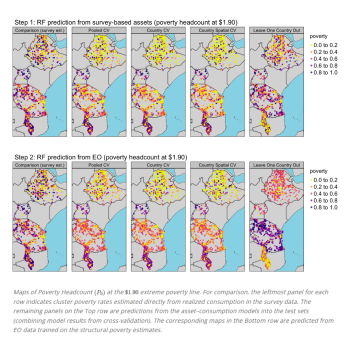
David S. Matteson, Director of the National Institute of Statistical Sciences (NISS) and Professor of Statistics at Cornell University, has co-authored a groundbreaking study recently published in the Proceedings of the National Academy of Sciences (PNAS): “Microlevel structural poverty estimates for southern and eastern Africa.” This research presents a novel machine learning-based approach for estimating structural poverty in southern and eastern Africa, offering an innovative alternative to traditional consumption-based poverty measures. The study was co-authored by Elizabeth Tennant (Department of Economics, Cornell University), Yating Ru (Department of City and Regional Planning, Cornell University), Peizan Sheng (Harris School of Public Policy, University of Chicago) and Christopher B. Barrett (Charles H. Dyson School of Applied Economics and Management, Cornell University).
One of the key contributions of this study is to provide nuanced insights into the underlying economic and social factors contributing to poverty. Unlike conventional measures, which often rely on static economic indicators, this approach integrates dynamic, data-driven methodologies that reflect real-world complexities more effectively. This ensures that policymakers can design more targeted and efficient interventions, addressing the root causes of poverty rather than just its symptoms.
Additionally, the study highlights how machine learning can be used not only to analyze historical data but also to forecast future trends in poverty distribution. This predictive capability is invaluable for governments and organizations aiming to allocate resources effectively and implement long-term strategies to reduce poverty levels sustainably.
Matteson’s work underscores the critical role of interdisciplinary collaboration in tackling global socio-economic challenges. By combining expertise in developmental economics, statistics & data science, and policy, the study represents a significant step toward improving poverty estimation methods and guiding targeted interventions.
For more details, the full study is available at PNAS: https://www.pnas.org/doi/10.1073/pnas.2410350122
See featured article on the Cornell website: ‘Structural poverty’ maps could steer help to world’s neediest | Cornell Chronicle
